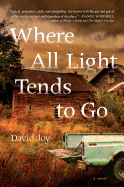
First-time novelist David Joy (author of the fly-fishing memoir Growing Gills) lives in the Blue Ridge Mountains of southwestern North Carolina--the same isolated setting where Jacob McNeely, the 18-year-old narrator of Where All Light Tends to Go, struggles with the dead-end life fate seems to have handed him. Joy's grim but satisfying story of the McNeely family faithfully echoes the language and atmosphere of this largely lawless mountain culture, a place where few "ventured without a good four-wheel-drive and a chainsaw," where people's broke-down shacks sit among broke-down trucks and cars such that "the whole lot was in dire need of a tetanus shot."
Choking in the tight hold of a ruthless drug-dealing father and largely ignored by a drug-addicted mother, Jacob quits school to take up his father's trade in a place with few options. As he sees it: "Blood's thicker than water, and I was drowning in it." He finds hope in Maggie Jennings, a top student and his much-coveted lover, who is not like the "girls who'd been raised on mayonnaise sandwiches in the holler." Like the FX series Justified or AMC's Breaking Bad, Joy's novel may be driven by hillbilly characters and a dope-dealing plot, but its heart is in its circumscribed setting. Maggie can get away to college, but Jacob sees the only other way out in death--"a place where all light tends to go, and I reckon that was heaven." Grim perhaps, but a story skillfully written. --Bruce Jacobs, founding partner, Watermark Books & Cafe, Wichita, Kan.

